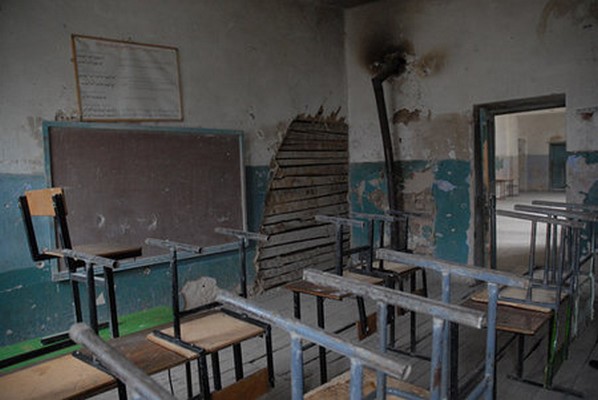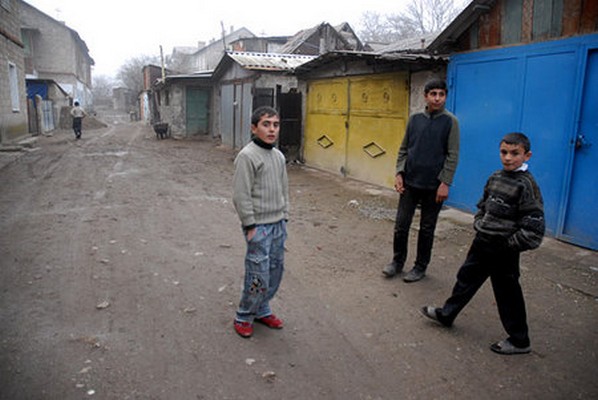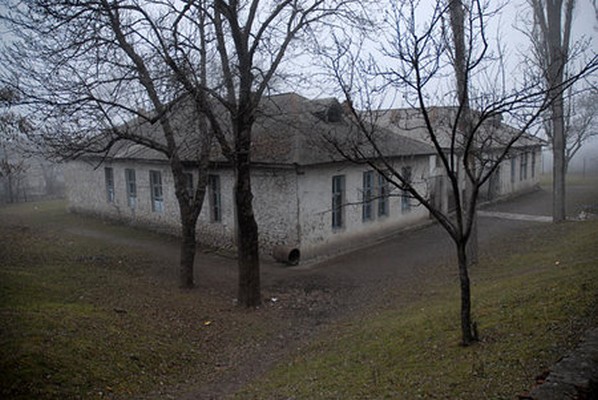This is the third in a series of multimedia reports on villages and urban districts in Georgia where Azeris and Armenians co-exist. You can learn more about this project and see more photos and video at TOL’s Steady State blog.
TSOPI, Georgia | Gunel Orucova and Vasili Petrosyan are seventh-grade students at the ramshackle school in Tsopi, about 75 kilometers south of Tbilisi and just a few kilometers from the border with Armenia. Gunel is ethnic Azeri, like four-fifths of the 80 pupils; the remainder are of Armenian descent, like Vasili.
- All photos by Onnik Krikorian.
The tension between Azerbaijan and Armenia over the disputed territory of Nagorno-Karabakh seems far away in Tsopi. Although they mostly live in separate quarters, the two communities – totaling 130 to 150 families, by local estimates – co-exist peaceably, congregating together in the village proper and forging friendships across ethnic lines, as they have for generations. Here, Armenians and Azeris are united by common concerns: poverty, unemployment, and a school squeezed by limited resources and crumbling conditions.
You can download this as a podcast by right-clicking here.
Transcript
(Music)
Gunel Orucova and Vasili Petrosyan are pupils of the village school in Tsopi, Georgia. There are 80 students here, 64 of them ethnic Azeris, like Gunel; 16 are Armenian, like Vasili. The boys are 14 years old and have been coming here together for seven years. Although they attend different sections of the school, separated by language, they have one home – Tsopi.
(Music)
The village is located in southeastern Georgia, a few kilometers from the border with Armenia. But there are no Georgians here – all the inhabitants are ethnically Azeri or Armenian. The locals say there used to be Georgians in Tsopi, as well as Greeks and Jews, but over the years they left because of the village’s poor condition.
(Music)
What Tsopi does offer its inhabitants is tolerance. They say there is no quarrel here between the two ethnicities. Faig Ahmadov is an Azeri resident.
AHMADOV: In this village there will never be tension. We have lived together since the time of our fathers and grandfathers. We cannot say that you are Armenian or you are Azeri.
They sometimes do remember Armenian-Azerbaijani problems elsewhere.
AHMADOV: All these problems like Karabagh come from politics. How can I say to my neighbor that you did this? As a neighbor, he has not done anything bad to me.
(Music)
The conflict over Nagorno-Karabakh remains a source of tension between the countries of Armenia and Azerbaijan, and often between the nationalities.
(Children’s voices)
But Gunel Orucova and Vasili Petrosyan say they don’t talk about these issues. They study Georgian history, not that of Armenia or Azerbaijan. They have friends across ethnic lines.
PETROSYAN: We come to each other’s home and play games together.
Vasili says. Gunel adds:
ORUCOVA: Sometimes we do our homework together and go for a walk to forest.
(Music)
Tsopi’s problem is not ethnic tension, but poverty. There is little work here, and most of inhabitants are unemployed. Ilham Ayvazov has not had steady work for years, although sometimes he goes to other villages and picks up work in construction.
AYVAZOV: Every day we go out and then return home and eat what we find at home.
Language is a barrier to finding work locally. In Soviet times Russian was the main language throughout the region, but since Georgia’s independence in 1991 Georgian has been the official language. Many residents conclude the only way to earn a proper living is to go to cities in Armenian or Azerbaijan, like Faig Ahmadov:
SB: I have no chance to work here. I’m one man in a family. I have to support my family – my wife, my 2 children and my old father and mother. I’m going to Baku soon to work. I hope to find a job there.
(Music)
Tsopi’s poverty is mirrored in the 55-year-old village school, with its wrecked walls, broken windows, and rotting floor. Gunel says:
ORUCOVA: We fall through the floor because of the rotten wood.
VO: Latifa Ibadova has been the school’s director for 11 years.
IBADOVA: What to say? I don’t know.
VO: She laments the state of the building.
IBADOVA: All the classrooms in use have glass in the windows, but not in the corridors. We don’t have enough money to buy glass. We don’t have any glass.
Holes in the walls and doors make many of the school’s rooms un-usable. Another problem for the school is heating Tsopi has electricity, but no gas. Throughout the village firewood is the main source of heat.
IBADOVA: We use fire firewood in school, too. The Ministry of Education helps us. This year they gave us money to buy two trucks worth of wood, and gasoline.
The residents themselves cannot afford firewood. It costs 300 to 400 lari – about 180 to 230 dollars – to buy two trucks of wood. To heat their homes they are forced to chop branches off trees, but this is against the law, and if they are caught the fine is 200 lari.
(Music)
Conditions in the village reinforce the school’s problems. Increasingly young people are leaving Tsopi. It is the only way to support their families. Fewer young families mean fewer students, and that means less state money for the school.
IBADOVA: Because of the lack of pupils we don’t have enough vouchers to solve the school’s problems. Our budget is not even enough for teachers’ salaries. That’s why the Ministry of Education gives us additional assistance.
Ibadova says the Georgian government has pledged to make improvements.
IBADOVA: We need repairs. We all expect it in 2011. The Ministry of Education promised to repair whole school in that year.
But parents in Tsopi are getting impatient, according to Faig Ahmadov:
AHMADOV: We just call it a school, but this is not a school. No one who sees it with their own eyes can call it a school.
(Music)
This is Khanim Javadova in Tsopi, Georgia, reporting for Transitions Online.
Tags: Conflict



